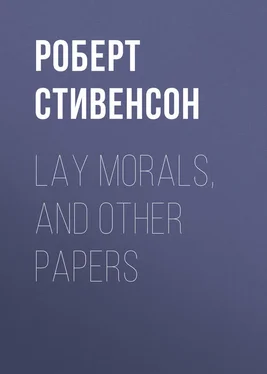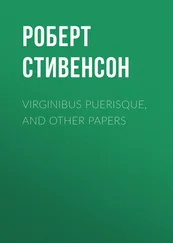Роберт Стивенсон - Lay Morals, and Other Papers
Здесь есть возможность читать онлайн «Роберт Стивенсон - Lay Morals, and Other Papers» — ознакомительный отрывок электронной книги совершенно бесплатно, а после прочтения отрывка купить полную версию. В некоторых случаях можно слушать аудио, скачать через торрент в формате fb2 и присутствует краткое содержание. Жанр: literature_19, foreign_antique, foreign_prose, essays, на английском языке. Описание произведения, (предисловие) а так же отзывы посетителей доступны на портале библиотеки ЛибКат.
- Название:Lay Morals, and Other Papers
- Автор:
- Жанр:
- Год:неизвестен
- ISBN:нет данных
- Рейтинг книги:3 / 5. Голосов: 1
-
Избранное:Добавить в избранное
- Отзывы:
-
Ваша оценка:
- 60
- 1
- 2
- 3
- 4
- 5
Lay Morals, and Other Papers: краткое содержание, описание и аннотация
Предлагаем к чтению аннотацию, описание, краткое содержание или предисловие (зависит от того, что написал сам автор книги «Lay Morals, and Other Papers»). Если вы не нашли необходимую информацию о книге — напишите в комментариях, мы постараемся отыскать её.
Lay Morals, and Other Papers — читать онлайн ознакомительный отрывок
Ниже представлен текст книги, разбитый по страницам. Система сохранения места последней прочитанной страницы, позволяет с удобством читать онлайн бесплатно книгу «Lay Morals, and Other Papers», без необходимости каждый раз заново искать на чём Вы остановились. Поставьте закладку, и сможете в любой момент перейти на страницу, на которой закончили чтение.
Интервал:
Закладка:
CHAPTER III
Although the world and life have in a sense become commonplace to our experience, it is but in an external torpor; the true sentiment slumbers within us; and we have but to reflect on ourselves or our surroundings to rekindle our astonishment. No length of habit can blunt our first surprise. Of the world I have but little to say in this connection; a few strokes shall suffice. We inhabit a dead ember swimming wide in the blank of space, dizzily spinning as it swims, and lighted up from several million miles away by a more horrible hell-fire than was ever conceived by the theological imagination. Yet the dead ember is a green, commodious dwelling-place; and the reverberation of this hell-fire ripens flower and fruit and mildly warms us on summer eves upon the lawn. Far off on all hands other dead embers, other flaming suns, wheel and race in the apparent void; the nearest is out of call, the farthest so far that the heart sickens in the effort to conceive the distance. Shipwrecked seamen on the deep, though they bestride but the truncheon of a boom, are safe and near at home compared with mankind on its bullet. Even to us who have known no other, it seems a strange, if not an appalling, place of residence.
But far stranger is the resident, man, a creature compact of wonders that, after centuries of custom, is still wonderful to himself. He inhabits a body which he is continually outliving, discarding and renewing. Food and sleep, by an unknown alchemy, restore his spirits and the freshness of his countenance. Hair grows on him like grass; his eyes, his brain, his sinews, thirst for action; he joys to see and touch and hear, to partake the sun and wind, to sit down and intently ponder on his astonishing attributes and situation, to rise up and run, to perform the strange and revolting round of physical functions. The sight of a flower, the note of a bird, will often move him deeply; yet he looks unconcerned on the impassable distances and portentous bonfires of the universe. He comprehends, he designs, he tames nature, rides the sea, ploughs, climbs the air in a balloon, makes vast inquiries, begins interminable labours, joins himself into federations and populous cities, spends his days to deliver the ends of the earth or to benefit unborn posterity; and yet knows himself for a piece of unsurpassed fragility and the creature of a few days. His sight, which conducts him, which takes notice of the farthest stars, which is miraculous in every way and a thing defying explanation or belief, is yet lodged in a piece of jelly, and can be extinguished with a touch. His heart, which all through life so indomitably, so athletically labours, is but a capsule, and may be stopped with a pin. His whole body, for all its savage energies, its leaping and its winged desires, may yet be tamed and conquered by a draught of air or a sprinkling of cold dew. What he calls death, which is the seeming arrest of everything, and the ruin and hateful transformation of the visible body, lies in wait for him outwardly in a thousand accidents, and grows up in secret diseases from within. He is still learning to be a man when his faculties are already beginning to decline; he has not yet understood himself or his position before he inevitably dies. And yet this mad, chimerical creature can take no thought of his last end, lives as though he were eternal, plunges with his vulnerable body into the shock of war, and daily affronts death with unconcern. He cannot take a step without pain or pleasure. His life is a tissue of sensations, which he distinguishes as they seem to come more directly from himself or his surroundings. He is conscious of himself as a joyer or a sufferer, as that which craves, chooses, and is satisfied; conscious of his surroundings as it were of an inexhaustible purveyor, the source of aspects, inspirations, wonders, cruel knocks and transporting caresses. Thus he goes on his way, stumbling among delights and agonies.
Matter is a far-fetched theory, and materialism is without a root in man. To him everything is important in the degree to which it moves him. The telegraph wires and posts, the electricity speeding from clerk to clerk, the clerks, the glad or sorrowful import of the message, and the paper on which it is finally brought to him at home, are all equally facts, all equally exist for man. A word or a thought can wound him as acutely as a knife of steel. If he thinks he is loved, he will rise up and glory to himself, although he be in a distant land and short of necessary bread. Does he think he is not loved? – he may have the woman at his beck, and there is not a joy for him in all the world. Indeed, if we are to make any account of this figment of reason, the distinction between material and immaterial, we shall conclude that the life of each man as an individual is immaterial, although the continuation and prospects of mankind as a race turn upon material conditions. The physical business of each man’s body is transacted for him; like a sybarite, he has attentive valets in his own viscera; he breathes, he sweats, he digests without an effort, or so much as a consenting volition; for the most part he even eats, not with a wakeful consciousness, but as it were between two thoughts. His life is centred among other and more important considerations; touch him in his honour or his love, creatures of the imagination which attach him to mankind or to an individual man or woman; cross him in his piety which connects his soul with heaven; and he turns from his food, he loathes his breath, and with a magnanimous emotion cuts the knots of his existence and frees himself at a blow from the web of pains and pleasures.
It follows that man is twofold at least; that he is not a rounded and autonomous empire; but that in the same body with him there dwell other powers tributary but independent. If I now behold one walking in a garden, curiously coloured and illuminated by the sun, digesting his food with elaborate chemistry, breathing, circulating blood, directing himself by the sight of his eyes, accommodating his body by a thousand delicate balancings to the wind and the uneven surface of the path, and all the time, perhaps, with his mind engaged about America, or the dog-star, or the attributes of God – what am I to say, or how am I to describe the thing I see? Is that truly a man, in the rigorous meaning of the word? or is it not a man and something else? What, then, are we to count the centre-bit and axle of a being so variously compounded? It is a question much debated. Some read his history in a certain intricacy of nerve and the success of successive digestions; others find him an exiled piece of heaven blown upon and determined by the breath of God; and both schools of theorists will scream like scalded children at a word of doubt. Yet either of these views, however plausible, is beside the question; either may be right; and I care not; I ask a more particular answer, and to a more immediate point. What is the man? There is Something that was before hunger and that remains behind after a meal. It may or may not be engaged in any given act or passion, but when it is, it changes, heightens, and sanctifies. Thus it is not engaged in lust, where satisfaction ends the chapter; and it is engaged in love, where no satisfaction can blunt the edge of the desire, and where age, sickness, or alienation may deface what was desirable without diminishing the sentiment. This something, which is the man, is a permanence which abides through the vicissitudes of passion, now overwhelmed and now triumphant, now unconscious of itself in the immediate distress of appetite or pain, now rising unclouded above all. So, to the man, his own central self fades and grows clear again amid the tumult of the senses, like a revolving Pharos in the night. It is forgotten; it is hid, it seems, for ever; and yet in the next calm hour he shall behold himself once more, shining and unmoved among changes and storm.
Читать дальшеИнтервал:
Закладка:
Похожие книги на «Lay Morals, and Other Papers»
Представляем Вашему вниманию похожие книги на «Lay Morals, and Other Papers» списком для выбора. Мы отобрали схожую по названию и смыслу литературу в надежде предоставить читателям больше вариантов отыскать новые, интересные, ещё непрочитанные произведения.
Обсуждение, отзывы о книге «Lay Morals, and Other Papers» и просто собственные мнения читателей. Оставьте ваши комментарии, напишите, что Вы думаете о произведении, его смысле или главных героях. Укажите что конкретно понравилось, а что нет, и почему Вы так считаете.












